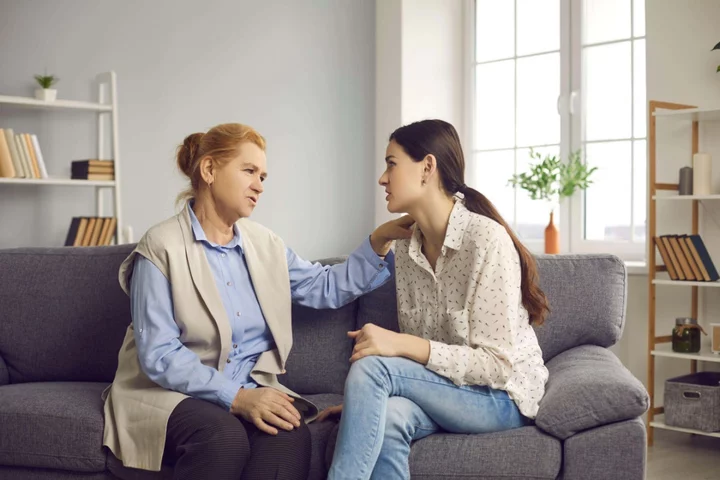
Alzheimer’s: How and when to talk to someone about their memory loss
You may have noticed someone close to you changing – perhaps they are more forgetful, not quite themselves. After a quick search online or a chat with family members or friends, you may be left thinking they’re developing Alzheimer’s. But how do you approach a conversation about dementia when it’s such an emotive topic? “As we get older, we’re all prone to becoming more forgetful, taking longer to remember certain things, getting distracted more easily or struggling to perform several tasks at once,” says head of knowledge at Alzheimer’s Society, Dr Tim Beanland. “These are common signs of getting older, but there is still a very sharp distinction between normal ageing and dementia.” Symptoms that may worry you “Symptoms of dementia gradually get worse over time,” Beanland explains, “and can appear as memory loss, confusion, needing help with everyday tasks, problems with language and understanding, or changes in behaviour. Although symptoms typically occur in people aged 65 and over, they can occasionally appear as early as twenty years sooner.” You may be scared Seeing these types of changes is understandably worrying – it’s a reminder of the age and health of those around us. “Noticing what might be dementia symptoms in a loved one can be distressing and confusing, particularly for people who have never dealt with dementia before,” Beanland says. “Both parties may feel nervous or worried about how to address the topic of potential dementia symptoms, and may not know where to begin.” Be open Beanland suggests asking questions like, ‘How are you feeling lately, physically and emotionally?’ Or ‘Do you have any health worries you’d like to talk about?’ It’s important to remember when approaching someone who may be experiencing dementia symptoms to do so gently, calmly and in a reassuring and supportive manner. “People experiencing dementia symptoms may find it difficult, or take a bit longer, to find the words they wish to say,” notes Beanland. “So, allowing them extra time, or giving them gentle prompts, can help them find the words they’re looking for, without highlighting they’ve forgotten something.” Do your research Dementia or Alzheimer’s may not be the only answer. It’s important to remember there are other conditions which can cause similar symptoms to dementia, such as thyroid problems or urinary tract infections, says Beanland. “Try to focus on helping the person see their GP, to find out what is causing the problems they are having. It’s also important to understand that, whether you are experiencing dementia symptoms personally or you’re a concerned loved one, you do not have to face dementia alone. There is support out there for you. “I’d encourage anyone worried about their own or a loved one’s memory to use Alzheimer’s Society’s symptoms checklist. It will help to unlock the vital care and support you need, and give you the precious time needed with your family to plan for the future.” Read More Charity boss speaks out over ‘traumatic’ encounter with royal aide Ukraine war’s heaviest fight rages in east - follow live As Simon Cowell shares positive therapy experience, how can it help even if you aren’t in crisis? Project launched to bust myth that cancer is a ‘white person’s disease’ 10 slick ways to kit out your student digs
2023-09-01 13:17
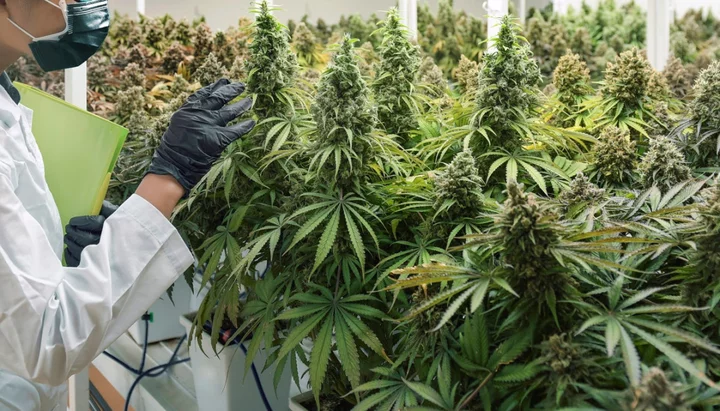
Marijuana users have higher levels of toxic metals in blood and urine, study finds
People who use marijuana were found to have higher levels of lead and cadmium in their blood and urine, in comparison to those who do not use weed, according to a new study. The team of researchers at Columbia University analysed data from blood and urine samples collected between 2005 and 2018 as part of the National Health and Nutrition Examination Survey, a program conducted by the National Center for Health Statistics. They looked at samples of 7,254 people who said they had used marijuana in the last 30 days. Participants were examined for levels of heavy metals and 358 people were found to have 27 per cent higher blood lead levels than those who said they didn’t use either marijuana or tobacco. There were also 22 per cent higher levels of cadmium in those marijuana users according to the research, which was published Wednesday in the journal Environmental Health Perspectives. Researchers also found that the urine samples showed similar results. High levels of cadmium can cause stomach irritation, abdominal cramps, nausea, vomiting and diarrhoea, according to Better Health. Researchers found that although tobacco is the main source of cadmium exposure in the general population, the study showed similar exposure levels among cannabis users. “For both cadmium and lead, these metals are likely to stay in the body for years, long after exposure ends,” Tiffany Sanchez, an author of the study and an assistant professor of environmental health sciences at Columbia’s Mailman School of Public Health said to NBC News. As cannabis plants can absorb heavy metals from soil - the new findings demonstrate that heavy metals in cannabis plants can also wind up in the human body. “Previous studies have measured metals in marijuana plants, products, or marijuana smoke,” study authors have said. Lead exposure can be particularly harmful to children and pregnant women. In adults, chronic exposure to lead increases the risk of high blood pressure, heart problems and kidney damage. “Our study wasn’t able to tease apart whether or not self-reported cannabis users were using medical or recreational cannabis, so we can’t say definitively if medical cannabis users specifically had higher metal levels,” Sanchez said as reported by CNN. “This is something that should be evaluated in future studies.” Heavy metals bind to parts of your cells that prevent your organs from doing their job, according to the Cleveland Clinic and symptoms of heavy metal poisoning can be life-threatening and can cause irreversible damage. “Immunocompromised people, such as those going through chemotherapy, may be at greater risk from metal exposure or from other common cannabis contaminants like molds. However, this is very much an understudied area,” Sanchez added. On Wednesday, the Department of Health and Human Services recommended that the Drug Enforcement Administration ease restrictions on marijuana by moving it from Schedule I drug to Schedule III. HHS Secretary Xavier Becerra said on X, the platform formerly known as Twitter, that the agency has responded to President Joe Biden’s request “to provide a scheduling recommendation for marijuana to the DEA.” “We’ve worked to ensure that a scientific evaluation be completed and shared expeditiously,” he added. Senate Majority Leader Chuck Schumer said in a statement that HHS had recommended that marijuana be moved from a Schedule I to a Schedule III controlled substance. “HHS has done the right thing,” Schumer said. “DEA should now follow through on this important step to greatly reduce the harm caused by draconian marijuana laws.” Rescheduling the drug would reduce or potentially eliminate criminal penalties for possession. Marijuana is currently classified as a Schedule I drug, alongside heroin and LSD. According to the DEA, Schedule I drugs "have no currently accepted medical use in the United States, a lack of accepted safety for use under medical supervision, and a high potential for abuse." Additional reporting from agencies Read More Biden health agency recommends classifying marijuana as lower-risk, opening potential for major policy changes Seth Rogen reveals why he smokes marijuana ‘all day, every single day’ Rugby star Ugo Monye: Boarding school shaped my career and my personality Queen Latifah calls for more ‘inclusive healthcare’ for people with obesity As Simon Cowell shares positive therapy experience, how can it help even if you aren’t in crisis?
2023-09-01 00:46
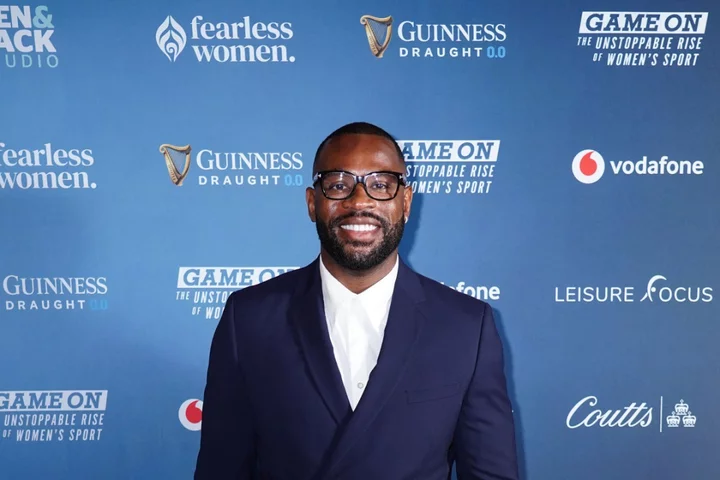
Rugby star Ugo Monye: Boarding school shaped my career and my personality
The Rugby World Cup and new series of Strictly Come Dancing are both set to kick off soon – and one man who knows just how hard both of them are is Ugo Monye. “Strictly is gruelling,” says the former rugby pro-turned-pundit, who played with Harlequins and England before taking part in Strictly in 2021. “At times you’re training for 12 hours a day. So, you could go for a period of three or four days where all you do is wake up, go to the studio, go to sleep, wake up, go to the studio, go to bed.” He recalls recently telling his friend, comedian Eddie Kadi, all about this, the night before he was announced as a contestant for this year’s show. And because of the demanding schedule, taking care of yourself becomes a top priority. “You try and eat right, try and get as much sleep as possible. The biggest initial challenge everyone will find is their feet, because they wouldn’t have been used to dancing for 11 hours a day,” adds Monye, 40, who was partnered with Oti Mabuse on the show. Trading his rugby boots for ballroom shoes came with some challenges, but he still completed five weeks on the show (Monye and Mabuse finished in 11th place that year). “I remember when I did the quickstep, I had my smart watch on, which showed that I danced over 45km in five days,” he recalls. “I remember the first week or two, just the nervousness of rolling out of bed and putting my feet on the carpet because you didn’t know how they would feel.” Having played such a physically demanding sport for 13 years at pro level, Monye was not in bad shape. But Strictly was another “type of pressure”. “When I retired in 2015, I never thought that I’d be dancing, dressed in a low cut, electric pink, short sleeve shirt doing the samba. It’s something I’m actually really proud of,” he adds happily. Like lots of people, Monye, who has two daughters – Phoenix Lilly, six, and Ruby, three, with his ex-wife Lucy – recalls how his approach to self-care has evolved over the years. “Going back to the early 2000s, I was living the dream, right? I was 18 and I got a professional contract playing for my boyhood club, and within a year I travelled the world playing for England,” he says. “I was all, what mental health? I’m flying, right?” Things shifted with time, however, and he began to see the importance of having a proactive approach to maintaining his mental wellbeing. “I remember speaking to a friend, who is really interested in mental health, [about how] people often seek [mental health support] after something bad or traumatic has happened to a point where they actually need it. But it’s more like how you have to go and get an MOT on your car and service it,” he explains. “I think towards the end of my career, I became more aware of it. I have now definitely paid more attention to it and I absolutely love psychology, so I love understanding how the mind works.” Since his retirement, Monye – who has teamed up with Samsung ahead of the World Cup, which starts on September 8 – he has been busy being a dad, alongside jumping into a vibrant broadcast career. Having daughters made him reflect on his own upbringing too – going from being raised by a single mother on a London council estate, to a rural boarding school in Hampshire where he had his education funded (Monye secured a sports scholarship when he was 13). He attributes a lot of his success to his schooling. “I think the person I am now was born at age 13. Everything I was surrounded by was slightly different in that world. It was where I first was introduced to rugby, which then has quite clearly gone on to shape my career, the pathway that I have now, but also my personality. “I think I rely upon myself, I back myself. I had to depend on myself and try and get things done,” he reflects. “I think my personality traits, good and bad, were all developed at boarding school.” Having spent large chunks of his childhood away from family, how does he manage his own work-life balance as a parent now? “How do you manage your work-life balance? Well, you stand in the middle of the park taking a phone call,” he jokes (Monye is in the playground with his girls while we talk). “The time I have with them is absolute quality. For the World Cup, I’m going out for like three or four stints. I’d love them to be able to come out, but with school, it is a bit more difficult. “But I have said to Phoenix already that next year is the Olympics, and she loves gymnastics, so she’s going to be getting on the Eurostar with me. She is watching a lot of clips of Simone Biles at the moment on YouTube and she’s obsessed.” He wants to see his daughters inspired by brilliant women. “I love to watch sports with my daughters,” says Monye. “And we loved watching the Women’s World Cup. I had to get them to come and watch incredible women just do it.” Ugo Monye has teamed up with Samsung to help the nation see the new laws clearly and watch the match in supersize, thanks to the Samsung 98” Q80C TV (samsung.com/uk/big-screen-tv). Read More Charity boss speaks out over ‘traumatic’ encounter with royal aide Ukraine war’s heaviest fight rages in east - follow live As Simon Cowell shares positive therapy experience, how can it help even if you aren’t in crisis? Project launched to bust myth that cancer is a ‘white person’s disease’ 10 slick ways to kit out your student digs
2023-08-31 23:25

Queen Latifah calls for more ‘inclusive healthcare’ for people with obesity
Queen Latifah is calling for more inclusive medical care for people with obesity. In a new interview as part of her work with It’s Bigger Than Me, a US-based campaign by healthcare company Novo Nordisk, the actor and rapper recounted how many people with obesity experience weight discrimination from medical staff. Sharing her personal connection to the issue, the Girls Trip star – whose real name Dana Owens – toldPeople: “I saw my cousin have to deal with this issue – she was morbidly obese and she went in and out of the hospital. “There were so many things she had to face. And for a doctor to just say, ‘Oh, you need to lose some weight.’ Well, it’s not that easy. Everyone’s bodies are not the same. We all deserve specific individual care.” Latifah, 53, backed the campaign’s call for “inclusive obesity care” ensuring everyone can feel “welcome and respected” when they visit the doctors. “Imagine how good it must feel when a patient walks through that door and sees the appropriate chairs or office set-up, that someone has considered them, has taken the time to think about what their needs are,” the Hairspray star said. “There’s a sense of, ‘I’m respected here. I’m welcome here’... If you’re discouraged to get into your doctor’s office, then that’s not a good thing.” When a person is defined as obese, this means that they are overweight “with a lot of body fat”, the NHS says. The World Health Organisation (WHO) explains that the terms “overweight” and “obesity” are used to refer to “abnormal or excessive fat accumulation that presents a risk to health”. It is estimated 64 per cent of adults in the UK are obese or overweight. Last summer, a British study found that obese patients were being “weight-shamed by doctors and nurses”, with weight stigmatisation pushing patients to skip appointments. The stigmatisation leads to patients avoiding appointments, feeling depressed or anxious and being more likely to put on weight, scientists said. The British researchers said there needed to be better education for medics over “weight stigma” to avoid this spilling into healthcare. The scientists looked at more than 3,000 research articles on the topic to identify strategies to tackle negative biases towards overweight and obese patients. In doing so, this could help to tackle the UK’s obesity crisis, as negative biases over weight limit access to healthcare services and treatment. Read More Joe Wicks defends decision to pull five-year-old daughter out of school Woman adopts husband’s ex-wife’s son after growing up in foster care herself Man who went to Turkey to make himself taller says pain was ‘worth it’ As Simon Cowell shares positive therapy experience, how can it help even if you aren’t in crisis? Man who went to Turkey to make himself taller says pain was ‘worth it’ Terminally ill mum prepares for worst after numb hand turns out to be deadly disease
2023-08-31 22:17
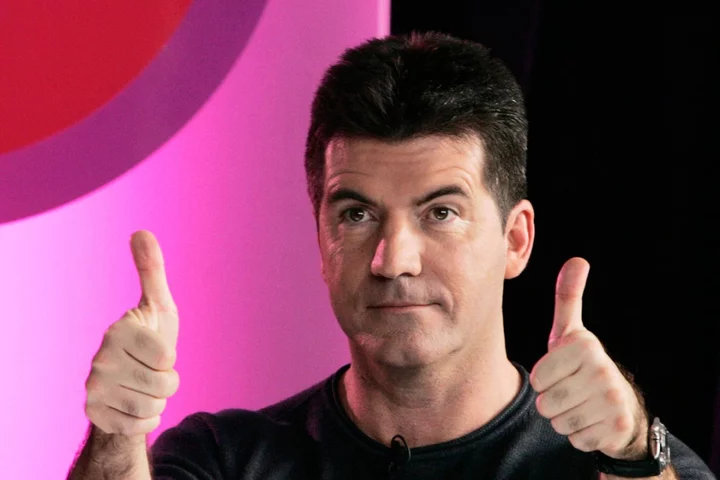
As Simon Cowell shares positive therapy experience, how can it help even if you aren’t in crisis?
X Factor boss Simon Cowell, 63, has shared that having discovered therapy in the past year, he feels as though “a weight has lifted off my shoulders”. The music mogul, who is behind The X Factor and Britain’s Got Talent, said he wished he had seen a therapist “10 or 20 years ago” in a recent interview with the Daily Mirror. He also shared that the deaths of his parents and the coronavirus pandemic had affected his mental health. Seeking therapy has been transformative for Cowell and it could do the same for you, whether you are in crisis, or just want to learn more about yourself. Cowell has said engaging in therapy had a “super positive effect” on his life and encouraged others to do the same, so here’s what you should know. There are different types of therapy Contrary to what many people may believe, counselling, where you sit and talk through events and reflect, is not the only form of therapy. “There are a whole host of different types of therapies available, from counselling, cognitive behavioural therapy, mindfulness-based cognitive therapy, acceptance and commitment therapy, interpersonal therapy, psychodynamic psychotherapy to eye movement desensitization and reprocessing,” explains psychologist and author of The Self-Care Revolution, Suzy Reading.Each one can have a different role in helping you get to know yourself better, handling trauma, feeling more grounded and coping more day-to-day. Therapy isn’t just for rock bottom Therapy doesn’t have to be a last resort. “When it comes to therapy, there are no hard and fast rules,” says Liz Ritchie, a St Andrew’s Healthcare psychotherapist. “Many people associate seeking help with crisis, but there is no reason why you cannot maintain regular sessions with your therapist. There is now a wealth of evidence that supports that therapy can also be a preventative form of mental healthcare, a little bit like going to a dentist or a doctor. “Life is busy and stressful, which means we don’t often have time to process cross words with a loved one, work altercations or issues with friends and family members.” You’ll understand yourself better You may think you understand yourself totally, but there are always new parts of ourselves to get to know. “Therapy helps us better understand ourselves, our relationships and the world, connecting us with how we feel, and why we might feel as we do. It is a journey of self-discovery, helping us appreciate our strengths and identify our values,” says Reading. It could give you an emotional toolkitIt can be helpful to have “an impartial sounding board to speak openly and honestly and the opportunity to be heard, validated and understood”, says Reading. “Therapy helps us challenge unhelpful thoughts, dispute self-limiting beliefs and can help us create new habits. Therapy is also about developing healthy ways to move through our emotions, creating a fresh toolkit of coping strategies and can be very practical in nature by helping us address specific challenges or goals.” But… it isn’t easy Unfortunately getting therapy is not always easy. If you do not have the financial freedom to be able to pay for a private therapist, you may be faced with long waiting lists and restrictive services. However, NHS therapy is an option and can be really helpful, so be sure to look into the options you can afford near you. Reading recommends checking out BPS and HCPC to find a qualified therapist. NHS resources can be accessed here. If you are seriously struggling with your mental health, and are at risk, please call 999 or the Samaritans on 116 123.
2023-08-31 20:54
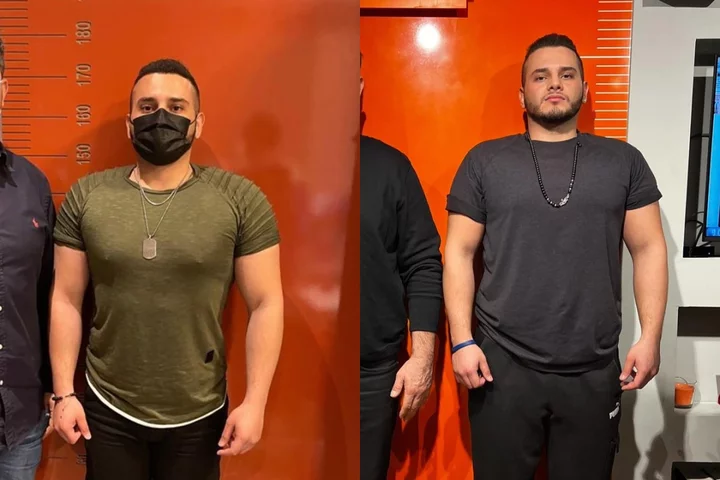
Man who lengthened his limbs by three inches feels ‘so much happier’
A Canadian man has had limb-lengthening surgery, costing £25,000, to increase his height from 5ft 7in to 5ft 10in as he was so insecure about his height it caused him to have “suicidal thoughts”, and claims he is now “so much happier” and “confident”. Daniel Farbod, 27, a civil engineer, from Toronto, Canada, has been self-conscious of his height “all (his) life” – when he stopped growing, at age 14, he said it felt “tragic” and like his “first stab to the heart.” Daniel always defined “being masculine” as being tall, and was “ashamed” of himself as he “didn’t feel like a man.” Over time, being taller was all Daniel could dream about, and claimed his height “impacted his mental health so badly” that he was having “suicidal thoughts”. After coming across the unique surgery online, he realised he was “willing to sacrifice time and money to get (his) life back.” So, in May 2021, he had his first procedure in a specialist clinic in Turkey, which involved breaking his femurs, hollowing out the bone, and putting a rod inside the bone with external fixators, pieces of steel on the outside of his legs. Daniel had to turn the fixators with an Allen key every day for over four months, and eventually had his second surgery to remove the fixators after his bones had successfully fused together. When Daniel recovered, he could not “put into words how happy (he) was” and “felt so much more confident”, now, he is sharing his journey on social media to inspire others who are insecure about their height. Daniel told PA Real Life: “I’m really proud of myself for having the surgery. “I was insecure all my life about my height, it impacted my mental health so badly. “I was suicidal, and after admitting that I wanted to take the steps to feel better, and have the surgery, I feel so much better. “I think for other people, it is important to know how tough the surgery and recovery is – it was the hardest thing I’ve ever done, but for me, it changed my life and made me grow not only literally but also metaphorically as a person.” Daniel, who has always been self-conscious about his height, stopped growing at age 14, and became obsessed with finding ways to become taller. He said: “I researched everything from socks and supplements that claimed to increase your height. “I was always insecure and worried about it – I used to go to orthopaedic doctors because I was so scared of not growing. “But when I got to age 14, I stopped and it was so depressing.” When it became clear to Daniel that he was unlikely to grow any more, it took a toll on his mental health and confidence. He explained: “It was so tragic for me, it was like my first stab to the heart. “All my dreams would be about being taller and I had to somehow accept that my height had peaked. “I tried to keep myself busy to manage my thoughts but in 2020 I just couldn’t handle it – I had all of these negative thoughts and suicidal thoughts because I think being masculine, and being a man, means to be tall. “I didn’t feel like a man, I was so ashamed.” Daniel felt as though having limb-lengthening surgery was the only way he was going to feel better, but his parents, who are both “on the shorter side”, did not approve of his decision to have cosmetic surgery. He said: “Everyone was really against the idea because they thought it was not natural and it was changing the way your body is meant to be. “I knew the surgery was going to be tough, but I thought even that pain would be better than having suicidal thoughts. “I was willing to sacrifice time and money to get my life back.” In May 2021, Daniel had his first surgery in a specialist clinic, Live Life Taller, in Turkey, which involved breaking both of his femurs, hollowing out the bone, and putting a rod inside the bone with external fixators – pieces of steel on the outside of his legs. He explained: “I was really scared when I got to the clinic, and the breaking of the bones was the part I was most nervous about in the whole process. “It was crazy to wake up after the surgery – the reality just hit me all at once and I was so happy.” His recovery involved being in a wheelchair and using an Allen key to turn a bolt on the fixators four times a day at 90 degrees to separate the bone segments a little at a time. Daniel continued to do this every day for four and a half months, saying of his painful recovery: “My skin was stretching, my muscles were growing, it was madness. “It took me even longer to recover, they usually say it will take three months, but, my I had nerve issues with my right leg and had to have it broken again. “It was a very tough time.” In September 2021, the external fixators were removed, he explained: “I used a walker and really really slowly I worked up to using crutches. “I couldn’t really tell how tall I was at that point. “It took me at least another three months to be able to stand up.” Mr Farbod went from 5 ft 7 to 5ft 10 and thinks his mental health has dramatically improved as a result. He said: “I couldn’t believe it. I had been dreaming of being a tall man since I was 10 years old, it’s all I’ve ever wanted. “I went through all these sleepless nights, trauma and upset, and I finally achieved my goal. “I can’t even put into words how happy I was, and still am – I felt so much more confident.” When Mr Farbod arrived home, his family were also very happy for him. He said: “They looked after me so much – I could barely get out of bed or bend down for a long time. “They could tell I was so much happier when I recovered.” Now, Daniel shares his journey on Instagram and YouTube to inspire others who are insecure about their height. He said: “I want to show people the reality of the surgery – it’s tough but I want to raise awareness and get men talking about their insecurities.” For support, contact the Samaritans on 116 123, email them at jo@samaritans.org, or visit samaritans.org to find your nearest branch. Read More Charity boss speaks out over ‘traumatic’ encounter with royal aide Ukraine war’s heaviest fight rages in east - follow live 10 slick ways to kit out your student digs 4 essential officecore trends to update your work wardrobe Sickle Cell Awareness Month: What is sickle cell disease and how do you know if you have it?
2023-08-31 16:52

Beekeepers to the rescue after 5 million bees fall off truck in Canada
One beekeeper who came to the rescue described a cloud of "angry, confused and homeless" bees.
2023-08-31 07:51

How to help in the aftermath of powerful Hurricane Idalia
Many organizations are on the ground responding to the disaster. Here's what you can do to support them.
2023-08-31 02:56
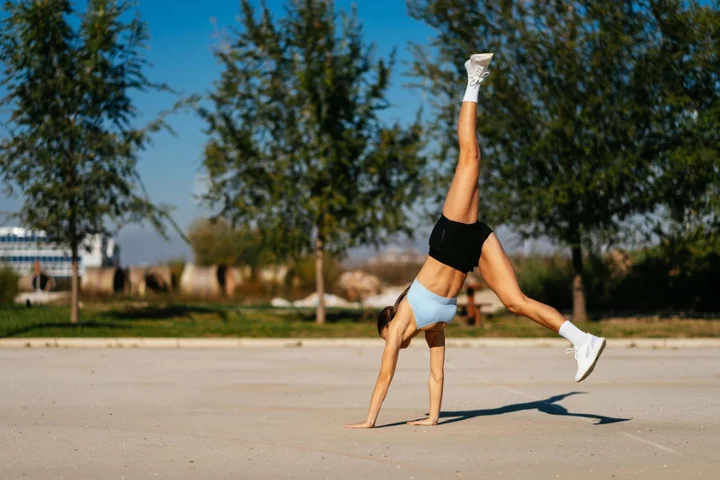
TikTok has gone wild for adult gymnastics – here’s what you should know
Have you always wanted to be able to do the splits or a backflip? Maybe you’ve watched your kids do a gymnastics class and thought, ‘Wow, that looks so fun’. Adult gymnastics is gaining some serious popularity online, with the TikTok hashtag #adultgymnastics getting over 209.5 million views. Influencers such as Anna Archer – who has over 300,000 followers on Instagram and creates content surrounding lots of different fitness experiments – and stunt woman Corinne Nicewick have shared clips of their experiences of trying out gymnastics as an adult. Nicewick, despite being a talented stuntwoman, has shared clips of how challenging she has found the sport, with viewers finding her attempts both funny and encouraging. Gymnastics has put some famous faces in good stead for other fitness-related challenges, with gymnast Beth Tweddle winning the 2103 series of Dancing on Ice and Ellie Downie, GB gymnast taking on the gruelling SAS: Who Dares Wins reality show in 2023.So, what do you need to know before you get involved? How does adult gymnastics work? Can anyone do it? Classes have been steadily cropping up across the UK encouraging adults of all abilities to get involved in gymnastics, and unless you have a health problem or injury that may restrict you from doing so, anyone can get involved. It is not so dissimilar to exercises you may already do like plyometrics (explosive body weight resistance exercises like box jumps), CrossFit or yoga. “Gymnastics is a series of different exercises that test your strength, mobility, flexibility and agility,” says Sofia Zolobova, instructor and gymnastics expert at Gymbox. “It’s also a lot of fun, incorporating lots of different floor, beam and hoop exercises,” she explains. This element of variety can bring a more fun, playful element to your workout routine. What are the health and wellbeing benefits of adult gymnastics? Gymnastics will give your body a really different workout and improve your strength, mobility and balance. “Strength and mobility are both very important as we grow older,” says Zolobova. “Gymnastics uses your own body weight, so not only do you get stronger, you move better. For example, to be able to execute a hand stand you need great shoulder mobility,” she explains. “With our modern tight shoulders, gymnastics can be helpful in improving our posture.” How do you get past being scared? As a kid, doing a cartwheel and taking a tumble doesn’t seem so threatening, but as adults we are all a bit more scared of getting hurt. Instead of falling into the trap of fear, embrace the playfulness of it. Zolobova says: “It’s a really fun way to exercise. It includes handstands, cartwheels and frog jumps, letting you unleash your inner child. It empowers you to do cool tricks as an adult and work up to a certain goal. It’s also a great fear fighter – sometimes you just have to let go and trust yourself.” What should we be careful of in adult gymnastics? Your fitness and flexibility may not progress as quickly as they might have done as a child. “Children are naturally more flexible than adults, so when undertaking gymnastics for the first time keep this in mind. Take things slow and one step at a time – you can always build up strength and flexibility with consistent practice,” explains Zolobova. How do we protect our backs and joints? Putting your back out or hurting your joints is a very real fear as an adult. Zolobova says: “Stretching should never be skimped on and should be thorough and dynamic [involving movement]. It’s also very important to make sure the body is warmed up before undertaking any gymnastic moves, a light jog and jumping jacks are great ways to get the muscles warm fast.”
2023-08-30 21:47
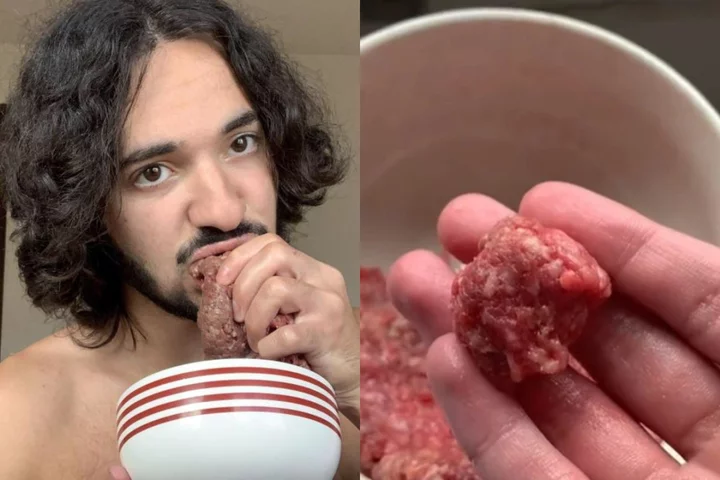
Man explains why he swapped veganism for raw meat diet: ‘I feel great’
A 20-year-old has swapped veganism for raw meat, eating uncooked items including beef, chicken, heart and liver on a daily basis for the past four years, and claims he has “never gotten sick”. Jones Hussain, from Stockholm, Sweden, has eaten raw chicken as well as raw cuts of beef, minced meat and fish, without batting an eyelid – even if they are brown or smell slightly. He says he would happily eat any kind of meat provided it is good quality, from “wild boar to camel” but that he prefers minced beef because it is cheap, accessible and does not smell compared with chicken. Jones took the decision to eat raw meat just a few months after quitting veganism in 2019 “in the name of health” after he watched a YouTube video with the late American alternative food nutritionist, Aajonus Vonderplanitz, whose “Primal Diet” has inspired people worldwide. Health has always been important for Jones, who supplements his raw meat diet with fruit and juiced vegetables. He said he would not eat cake for £10,000 because of the sugar and claims to have not had a slice since the age of 13. “If any food safety expert looked at the food I eat, I think they would have a heart attack because the beef is sometimes brown, the liver looks green, the chicken stinks,” Jones told PA Real Life. “But I eat that and then nothing happens. “I did the experiments on myself to see whether what we have been led to believe is actually true and surprise, surprise, it wasn’t.” Jones, who said he has always been driven by “health”, came across the raw meat diet plan in 2019 a few months after quitting veganism. “My starting point has always been health,” he said. “So I’ve experimented with a bunch of things in the name of health.” The diet was designed by Vonderplanitz, who touted the benefits of eating raw foods, in particular meat and dairy. “I found one of his lectures on YouTube and started listening,” he said. “At first, I was just as shocked as anyone would be to see someone eat such a diet.” But Jones said he found Vonderplanitz’s arguments to be “honest and convincing” and so decided to give it a try. “I ate raw meat for the first time in November 2019 and I felt great,” he said. “It was just a straight cut of raw beef.” Having not fallen ill, Jones then decided to try raw ground beef. “That was the scary part because that’s when you enter into uncharted territory,” he said. “I was like, if I get sick then I won’t do this anymore. “Lo and behold, again, I didn’t get sick, so I started eating raw ground beef because it’s much cheaper than straight cuts.” To start with, Jones would flavour the raw meat with spices and garlic. “But then I felt that I didn’t need them, even from a taste perspective,” he said. “So I just started consuming it by itself and ever since then I’ve eaten raw ground beef almost every day.” By the summer of 2020, Jones had become accustomed to eating all types of meat. “I had no problems eating raw chicken because I had found a fairly good source in the supermarket so I ate it like KFC,” he said. “I also started buying raw liver here and there, and eating a small amount every day.” The raw meat Jones kept in his fridge soon started to turn “green”, but this did not stop him from eating it. “Since I was so convinced about what Aajonus was saying, I was not worried and just consumed it,” he said. “But if there was any white mould, then I got rid of the batch, although this did not happen very often.” Jones has continued eating raw meat ever since, although his family prefers ground beef to chicken because of the smell. “Nowadays I don’t so much eat raw chicken because it stinks up the house,” he said. In a single sitting, Jones said he is capable of consuming around 400g of raw liver. He said he believes dumping veganism for raw meat has improved his gut health and helped get rid of his acne. “The thing with raw meat is that the nutrients are more easily absorbed and unaltered,” he claimed. “It’s not that raw meat has some kind of special super power, it’s just that by not cooking it, I get more nutrients and no byproducts.” NHS guidelines, however, state that “cooking meat properly” kills harmful bacteria which can cause food poisoning. Jones had been a vegan for two years, from 2017 to 2019, before eventually converting to the primal diet. “It’s not that I was struggling to get enough nutrients,” he said. “It’s that a human being cannot survive on a vegan diet successfully. “Of course you can take supplements but it’s not the same thing, because they are processed. “There is no other way of getting these nutrients naturally other than by eating animal products. “So veganism on that basis, falls on its face.” Jones also eats raw fish such as salmon and tuna and said he is happy to eat any type of meat provided he can find a reliable supplier. The Primal Diet also includes fruit and vegetables, all of which are consumed raw. “I eat cucumbers and tomatoes, as well as oranges and apples when they are available to me,” he said. “The philosophy is don’t cook the food, but there is a variety.” Jones’ unusual diet often shocks people, including his parents who are concerned for his wellbeing. He explained: “Usually people have the same reaction, at first they think what the hell is this guy doing? He’s going to die in a few days. “Then they speak to me and find out that I’ve been doing it for three and half years, that I’ve never gotten sick, that my arguments are logical and that I look healthy. “They are like all right, that’s a new perspective that I had not heard before.” People behave differently on social media, however, said Jones, who has his own YouTube channel, Excellent Health. He also works part time at an elderly day care centre and has written a book titled The 6 Health Commandments. “The only time I ever got food poisoning was from a frozen bag of raspberries before I started eating meat,” he said. “I decided not to act out of fear, but to see what is true and what isn’t true.” To find out more about food safety, visit www.food.gov.uk/safety-hygiene/cooking-your-food. Read More Eating a raw vegan diet almost killed me Study reveals one thing to focus on if you want to live to 100 Charity boss speaks out over ‘traumatic’ encounter with royal aide Ukraine war’s heaviest fight rages in east - follow live
2023-08-30 19:19
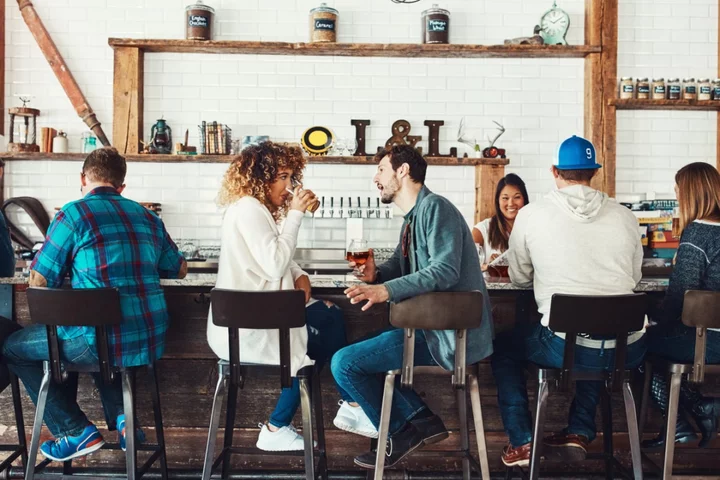
Drinking alcohol does not result in ‘beer goggles’ making people look more attractive, study says
When it comes to approaching someone you like at a bar, it may be more a case of alcohol giving you liquid courage than “beer goggles”, researchers say. A new study suggests drinking alcohol makes people more likely to approach someone they already find attractive, but does not make others appear more attractive. Some people argue that intoxication makes others seem better-looking – but according to the researchers, this has not been systematically studied. Past research typically had people simply rate others’ attractiveness while sober and while intoxicated based on photos. But the new study added the possibility of meeting the people being rated. The study, led by Molly Bowdring of the Stanford Prevention Research Centre, Stanford University, in the USA (affiliated with University of Pittsburgh at the time of this study), and her dissertation adviser, Michael Sayette, involved 18 pairs of male friends in their twenties. The men were brought to the laboratory to rate the attractiveness of people they saw in photos and videos. They were also told that they may be given the chance to interact with one of those people in a future experiment. After the ratings were given, the men were asked to pick those who they would most like to interact with. Pairs of men visited the lab on two occasions – on one occasion they both received alcohol to drink – up to about a blood alcohol concentration of .08 per cent, the legal limit for driving in England, Wales and Northern Ireland, and the United States, and on the other occasion, they both received a non-alcoholic drink. Friend pairs entered the lab together in order to mimic social interactions that would typically take place in a real drinking situation. The researchers say they did not find evidence of beer goggles – whether or not the men were intoxicated had no effect on how good-looking they found others. Professor Sayette, from the University of Pittsburgh, said: “The well-known beer goggles effect of alcohol does sometimes appear in the literature, but not as consistently as one might expect.” However, according to the findings, drinking alcohol may affect how people react to those they find attractive in a different way. The researchers found it impacted how likely the men were to want to interact with people they found attractive. When drinking, they were 1.71 times more likely to select one of their top-four attractive candidates to potentially meet in a future study compared with when they were sober. The researchers suggest alcohol may not be altering perception but rather enhancing confidence in interactions, giving the men liquid courage to want to meet those they found the most attractive. According to the researchers, the findings could have implications for therapists and patients. Prof Bowdring said: “People who drink alcohol may benefit by recognising that valued social motivations and intentions change when drinking in ways that may be appealing in the short term, but possibly harmful in the long term.” The findings are published in the Journal of Studies on Alcohol and Drugs. Read More Yewande Biala thought she was unique in never having had an orgasm – then she made a film about it The dish that defines me: Evelin Eros’s rum cake Woman adopts husband’s ex-wife’s son after growing up in foster care herself Charity boss speaks out over ‘traumatic’ encounter with royal aide Ukraine war’s heaviest fight rages in east - follow live
2023-08-30 15:28

Families of troops killed in Abbey Gate bombing in Afghanistan demand accountability in emotional testimony
Family members of the 13 US service members killed two years ago in the Abbey Gate bombing during the US withdrawal from Afghanistan demanded accountability and answers from the Biden administration on Tuesday in emotional testimony about the withdrawal and their losses.
2023-08-30 06:23
